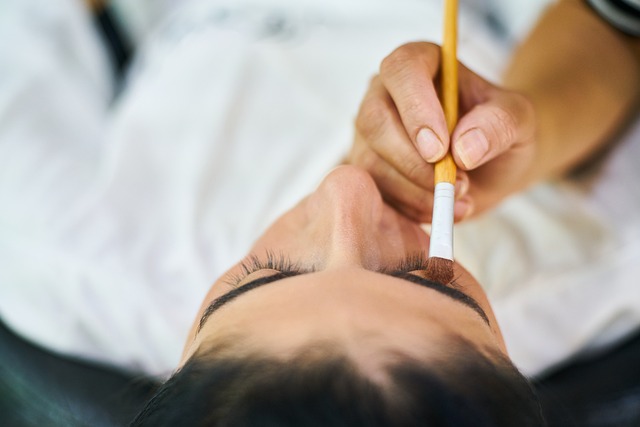Residents of Bristol exploring natural and cost-effective methods for skin tag removal may consider using acetic acid from pharmaceutical-grade vinegar. This treatment involves applying the acid directly to the skin tag, which causes it to darken and fall off over a period of days to weeks, depending on its size and attachment. It's important to use a protective barrier like petroleum jelly to prevent irritation and to exercise caution, especially when treating sensitive areas. While vinegar can be an effective home remedy for skin tag removal in Bristol, it's advisable to consult with a healthcare provider first, as they can evaluate individual health conditions and provide personalized advice. This approach is not suitable for individuals with diabetes or compromised immune systems due to the risk of infection. Regular monitoring and adherence to medical guidance are essential for safe removal. The article provides a step-by-step guide on how to apply vinegar for skin tag removal, emphasizing the importance of a clean and dry environment, consistent application, and post-removal treatment with tea tree oil to prevent infection. This method complements Bristol Skin Tag Removal practices and serves as a viable alternative to professional treatments.
Exploring the safe and natural approach to skin tag removal, our article sheds light on how residents of Bristol can effectively banish these minor growths using vinegar. Delving into the process, we provide a comprehensive guide tailored for those seeking a home remedy. By understanding the mechanisms behind vinegar’s efficacy in skin tag removal and following our step-by-step instructions, readers in Bristol will be well-equipped to manage this common cosmetic concern without medical intervention.
- Understanding Skin Tag Removal in Bristol: Vinegar as an Effective Solution
- Step-by-Step Guide to Safely Remove Skin Tags with Vinegar in Bristol
Understanding Skin Tag Removal in Bristol: Vinegar as an Effective Solution

Residents in Bristol who are seeking a natural and cost-effective method for skin tag removal may find vinegar to be an efficient solution. The process of using vinegar to remove skin tags involves carefully applying acetic acid, the active component in vinegar, directly to the tag. This acid gradually causes the skin tag to darken and fall off, often within a few days to two weeks, depending on the size and attachment of the tag. It’s imperative to use a concentrated form of acetic acid, typically found in pharmacies or health stores, as common household vinegar may not be potent enough. The procedure should only be performed on skin tags that are not sensitive or in areas where skin sensitivity is a concern, such as the face or genitals. It’s also crucial to follow safety guidelines, including protecting surrounding skin with petroleum jelly or a similar barrier to prevent irritation, and applying the vinegar sparingly to avoid over-treating or damaging healthy skin.
Bristol skin tag removal using vinegar is gaining popularity due to its accessibility and effectiveness compared to medical treatments. However, it’s essential to approach this home remedy with caution and only after consulting with a healthcare provider. They can offer advice on whether this method is suitable for your specific condition and guide you through the process to ensure safety and effectiveness. Additionally, individuals with diabetes or those who are immunocompromised should avoid this treatment due to the risk of infection. Regular monitoring and adherence to medical recommendations are key when considering at-home remedies for skin tag removal in Bristol.
Step-by-Step Guide to Safely Remove Skin Tags with Vinegar in Bristol

In Bristol, individuals seeking a natural and cost-effective method to remove skin tags can consider using vinegar as an at-home treatment. This step-by-step guide offers a safe approach to utilizing vinegar for skin tag removal. Begin by selecting a high-concentration vinegar, such as acetic acid, which is the active ingredient effective in treating skin tags. Apply a cotton ball soaked in the vinegar directly to the skin tag once or twice daily. Ensure that the surrounding skin is protected with a bandage to prevent exposure to the vinegar, as it can cause irritation. After several applications, the skin tag should begin to darken and dry out, indicating that it is responding to the treatment. Once the skin tag becomes completely black and feels ready to fall off, gently remove it by wiping away with a clean tissue or by washing it off under a warm tap. If any remnants remain, apply tea tree oil to prevent infection and promote healing.
For best results, follow this regimen consistently over a period of one to two weeks. It’s crucial to monitor the skin tag’s response throughout the process; should you notice any signs of infection or adverse reaction, discontinue use immediately and consult a healthcare professional. In Bristol Skin Tag Removal practices, it is also recommended to perform this treatment in a well-ventilated area and to avoid getting vinegar in your eyes or on mucous membranes. Remember to keep the area clean and dry after each application to prevent bacterial growth and to accelerate healing. By adhering to these guidelines, you can effectively and safely remove skin tags with vinegar in Bristol.
For those in Bristol seeking a natural and cost-effective method for skin tag removal, understanding the process and safely executing it at home can be empowering. This article has outlined the benefits of using vinegar as an effective solution, guiding readers through each step to ensure safe and successful removal. By adhering to the advice provided, residents of Bristol now have a reliable alternative to medical procedures, thanks to the accessibility of household vinegar. With proper caution and technique, individuals can effectively address their skin tag concerns without the need for invasive treatments. Remember to always consult with a healthcare professional if you have any doubts or conditions that may affect the removal process. For those in Bristol, this home remedy offers a practical solution for a commonly encountered issue.
